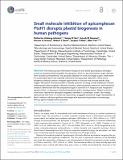Small molecule inhibition of apicomplexan FtsH1 disrupts plastid biogenesis in human pathogens
Author(s)
Amberg-Johnson, Katherine; Ganesan, Suresh M.; Lorenzi, Hernan A.; Niles, Jacquin C.; Yeh, Ellen; Hari, Sanjay B.; Sauer, Robert T.; ... Show more Show less
Downloadelife-29865-v2.pdf (848.2Kb)
PUBLISHER_POLICY
Publisher Policy
Article is made available in accordance with the publisher's policy and may be subject to US copyright law. Please refer to the publisher's site for terms of use.
Terms of use
Metadata
Show full item recordAbstract
The malaria parasite Plasmodium falciparum and related apicomplexan pathogens contain an essential plastid organelle, the apicoplast, which is a key anti-parasitic target. Derived from secondary endosymbiosis, the apicoplast depends on novel, but largely cryptic, mechanisms for protein/lipid import and organelle inheritance during parasite replication. These critical biogenesis pathways present untapped opportunities to discover new parasite-specific drug targets. We used an innovative screen to identify actinonin as having a novel mechanism-of-action inhibiting apicoplast biogenesis. Resistant mutation, chemical-genetic interaction, and biochemical inhibition demonstrate that the unexpected target of actinonin in P. falciparum and Toxoplasma gondii is FtsH1, a homolog of a bacterial membrane AAA+ metalloprotease. PfFtsH1 is the first novel factor required for apicoplast biogenesis identified in a phenotypic screen. Our findings demonstrate that FtsH1 is a novel and, importantly, druggable antimalarial target. Development of FtsH1 inhibitors will have significant advantages with improved drug kinetics and multistage efficacy against multiple human parasites.
Date issued
2017-08Department
Massachusetts Institute of Technology. Department of Biological Engineering; Massachusetts Institute of Technology. Department of BiologyJournal
eLife
Publisher
eLife Sciences Publications, Ltd
Citation
Amberg-Johnson,et al. “Small Molecule Inhibition of Apicomplexan FtsH1 Disrupts Plastid Biogenesis in Human Pathogens.” eLife 2017, 6 (August 2017): e29865 © Amberg-Johnson et al
Version: Final published version
ISSN
2050-084X